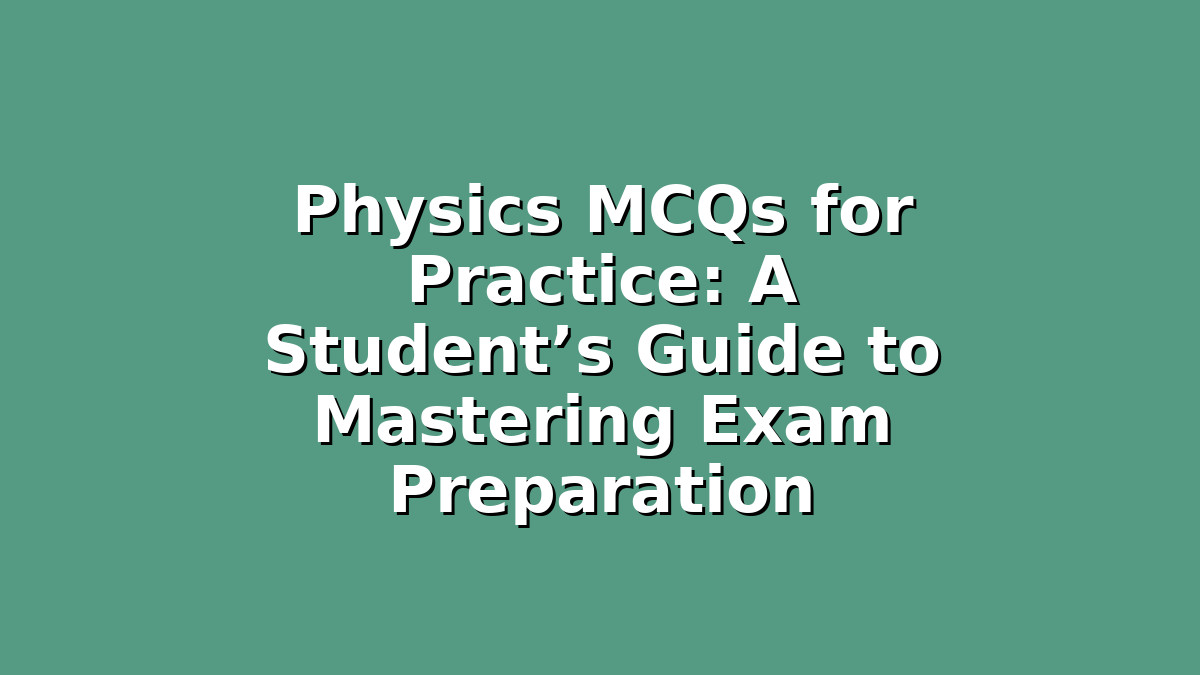Preparing for physics exams can sometimes feel overwhelming, especially with the vast amount of concepts and formulas to remember. One of the most effective ways to reinforce your understanding and boost your confidence is by practicing Multiple Choice Questions (MCQs). Physics MCQs are not only a great tool to test your knowledge but also help you develop quick problem-solving skills essential for exams. In this article, we’ll explore why physics MCQs are valuable, how to use them effectively, and some study tips to maximize your preparation.
Why Physics MCQs Are Essential for Exam Success
Multiple Choice Questions are a common format in many physics exams, from school-level tests to competitive entrance exams. Here’s why practicing physics MCQs can make a significant difference in your preparation:
1. Active Recall and Reinforcement: Answering MCQs forces you to actively recall important concepts rather than passively reading notes. This active engagement helps strengthen your memory and understanding.
2. Identifying Knowledge Gaps: When you tackle a variety of MCQs, you quickly discover which topics you’re strong in and which require further study. This targeted approach saves time and improves overall efficiency.
3. Time Management Practice: Physics exams often have limited time, and MCQs help you practice managing your time wisely. Developing the skill to quickly analyze questions and eliminate wrong options can boost your performance under pressure.
4. Conceptual Clarity: Many physics MCQs test your conceptual understanding rather than simple formula memorization. This encourages deeper learning and prepares you to tackle new or tricky problems.
Section 1: How to Practice Physics MCQs Effectively
Merely going through a list of questions isn’t enough. To get the most out of your MCQ practice, follow these steps:
– Start With Topics You’ve Studied: Begin practicing MCQs on topics you have recently covered in class or self-study. This will reinforce your learning and boost confidence.
– Use Quality Question Banks: Choose MCQs from trusted textbooks, past exam papers, or reputable online platforms. Quality questions that challenge your understanding are key.
– Take Notes on Mistakes: Maintain a dedicated notebook or digital document where you record questions you got wrong or found difficult. Write down why the correct answer is right and why the others are wrong. Reviewing these notes regularly will help you avoid repeating mistakes.
– Simulate Exam Conditions: Practice MCQs in a timed environment, without using notes or calculators (unless allowed). This will train your brain to recall information quickly and accurately under exam pressure.
– Gradually Increase Difficulty: Start with easier questions to build confidence and then move on to more challenging ones. This progressive approach will help you build a strong foundation while pushing your limits.
Section 2: Integrating MCQs With Other Study Techniques
While MCQs are a powerful tool, combining them with other study methods can enhance your overall preparation:
– Understand Before You Memorize: Before diving into MCQs, ensure you comprehend the underlying physics concepts. Textbooks, video lessons, and classroom notes are ideal for building this foundation. When you understand the “why” behind a concept, MCQs become easier to solve.
– Use Diagrams and Visual Aids: Physics often involves visualizing problems, such as forces, waves, circuits, or motion trajectories. When reviewing MCQs, draw diagrams if it helps clarify the problem. Visual learning can deepen your understanding.
– Group Study and Discussion: Sometimes discussing MCQs with peers can provide new insights and clarify doubts. Join study groups or online forums where you can share questions, explanations, and learning tips.
– Regular Revision: Incorporate MCQs into your revision schedule. Spaced repetition—reviewing MCQs at increasing intervals—helps transfer knowledge from short-term to long-term memory.
– Link Formulas to Concepts: Instead of rote memorizing formulas, try to understand their derivation and applications. When answering MCQs, this conceptual grasp allows you to eliminate options more efficiently.
Section 3: Additional Tips to Stay Motivated and Confident
Studying physics can be challenging, but staying motivated and confident is crucial to success. Here are some tips to keep your spirits high:
– Set Realistic Goals: Break your study sessions into manageable goals, such as completing 20 MCQs on one topic per day. Meeting these targets provides a sense of achievement and keeps you motivated.
– Celebrate Small Wins: Every time you master a topic or improve your score, reward yourself. Positive reinforcement encourages consistent effort.
– Maintain a Balanced Routine: Ensure your study routine includes breaks, exercise, and enough sleep. A healthy body supports a sharp mind.
– Stay Positive About Mistakes: View incorrect answers as opportunities to learn rather than failures. Each mistake brings you closer to mastering the subject.
– Visualize Success: Imagine yourself confidently answering physics questions in the exam room. This mental preparation can reduce anxiety and boost performance.
Conclusion
Practicing physics MCQs is an excellent strategy to prepare for exams effectively. By actively engaging with questions, identifying weak areas, and combining MCQs with other study methods, you can build both conceptual understanding and exam readiness. Remember, persistence and smart practice are key. Stay motivated, track your progress, and don’t hesitate to seek help when needed. With consistent effort, physics will not only become manageable but also enjoyable. Best of luck in your exam preparation!

Responses